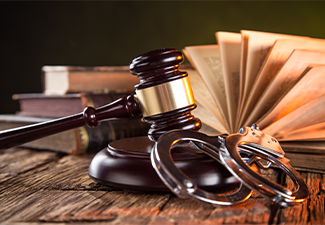What Are the Differences Between a Felony and a Misdemeanor?
April 2, 2025
 Felonies are serious offenses with severe penalties, including hefty prison sentences, fines, and other long-term consequences. Misdemeanors, while less severe, are still significant crimes and can lead to jail time, substantial fines, or probation.
Felonies are serious offenses with severe penalties, including hefty prison sentences, fines, and other long-term consequences. Misdemeanors, while less severe, are still significant crimes and can lead to jail time, substantial fines, or probation.
As a criminal defense attorney at The Hardin Law Firm in St. Louis, Missouri, I’ve seen firsthand how these two types of charges can impact someone's life.
While the differences between these two classifications might seem clear, the line between them can sometimes blur, and the consequences of either can be life-altering. In this post, we’ll break down the main distinctions between a felony and a misdemeanor and what they mean for your case.
What Penalties Are Associated With Felonies?
Felonies are generally defined as crimes that are considered more serious and are punishable by a minimum of one year in prison. These offenses can include crimes like murder, rape, robbery, and large-scale drug trafficking. In some cases, felonies can lead to life sentences or even the death penalty, depending on the severity of the crime and local laws.
Felony convictions are often accompanied by significant social, legal, and financial repercussions that can last for a lifetime. The consequences extend beyond the courtroom, impacting personal lives and future opportunities.
Some common characteristics of felonies include:
Longer prison sentences: Felonies often result in sentences of one year or more, sometimes even life in prison.
Higher fines: Convictions for felony offenses often come with significant financial penalties, sometimes reaching thousands of dollars.
Loss of certain rights: Individuals convicted of felonies may lose certain civil rights, such as the right to vote, own firearms, or hold certain jobs.
Permanent criminal record: A felony conviction can have long-lasting effects on your record and future opportunities.
Additionally, those convicted of felonies may face challenges in securing housing, employment, and educational opportunities. The impact can affect one's personal life and future stability.
Because of the severity of the consequences associated with felony charges, it’s important to work with a criminal defense lawyer. They can help reduce the potential penalties or argue for a lesser sentence. An experienced attorney can assess the case, negotiate plea deals, and work toward minimizing the long-term effects of a felony conviction.
The Nature of Misdemeanors and Their Consequences
Misdemeanors, by contrast, are crimes that are less severe and typically carry lighter penalties. Misdemeanors can involve offenses such as petty theft, vandalism, simple assault, or public intoxication. While these crimes still carry consequences, they don’t usually lead to long prison sentences.
Some typical features of misdemeanors include:
Shorter jail sentences: Misdemeanors generally result in sentences of less than one year in jail, with many offenders serving their time in county jails rather than state or federal prisons.
Fines: Misdemeanors often come with smaller fines than felonies, but they can still be significant, depending on the offense.
Probation or community service: Instead of jail time, a misdemeanor conviction might result in probation, community service, or other alternative forms of punishment.
Less impact on civil rights: In most cases, misdemeanor convictions don’t result in the loss of civil rights, such as the right to vote or possess firearms.
Although misdemeanors are less severe, they can still carry consequences that affect your future, including the potential for a criminal record and challenges when seeking employment or housing. It's important to address any misdemeanor charges with proper legal representation to minimize penalties.
What Are the Key Differences Between Felonies and Misdemeanors?
The primary differences between felonies and misdemeanors come down to the severity of the crime, the length of the punishment, and the long-term consequences. Here's a breakdown of some of the key distinctions:
Severity of the crime: Felonies involve more serious crimes, such as violent offenses or large-scale theft. Misdemeanors usually involve less serious offenses like minor theft or public disorderly conduct.
Length of punishment: Felonies can lead to years or even life sentences, while misdemeanors usually result in less than a year of jail time or alternative penalties like probation.
Fines: Felonies tend to involve higher fines, while misdemeanor fines are generally less severe.
Long-term consequences: Felony convictions often come with long-lasting effects, such as loss of civil rights and greater difficulty securing housing or employment. Misdemeanors, while still serious, usually have fewer long-term consequences.
Understanding these differences is important when facing charges. Whether you’re charged with a felony or a misdemeanor, having an experienced criminal defense attorney can make a significant difference in the outcome of your case.
What Happens When Felony Charges Are Reduced to Misdemeanors?
In some cases, felony charges can be reduced to misdemeanors through plea bargaining or other legal processes. This often happens when there are mitigating circumstances, such as lack of intent or insufficient evidence to prove the felony. For example:
Plea deals: In some instances, the prosecution may agree to reduce a felony charge to a misdemeanor in exchange for a guilty plea or cooperation with the investigation.
Expungement: After serving time for a misdemeanor, it may be possible to have the conviction expunged from your record, helping to clear your criminal history.
Reducing a felony to a misdemeanor can significantly reduce the penalties and help mitigate some of the long-term consequences. This is why having a skilled criminal defense lawyer is crucial—so they can negotiate the best possible outcome for your situation.
What Are the Long-Term Implications of Felony and Misdemeanor Convictions?
The long-term implications of a felony conviction are often far-reaching. A felony conviction can result in:
Inability to vote or own firearms: Many states strip felons of their right to vote, and some prohibit felons from owning firearms. This can affect a person’s ability to fully participate in society and exercise their rights as a citizen.
Difficulty finding employment: Many employers conduct background checks and may disqualify individuals with felony convictions. This can significantly limit career opportunities and hinder a person’s ability to earn a stable income.
Stigma: Being convicted of a felony can carry a social stigma, which can affect relationships and reputation. Friends, family, and the community may treat individuals with a felony conviction differently, leading to feelings of isolation or discrimination.
Impact on housing: Felony convictions can also make it more difficult to find housing, as many landlords perform background checks and may refuse to rent to individuals with criminal records.
On the other hand, while misdemeanors are less severe, they can still create challenges, particularly when applying for jobs, housing, or certain licenses. Even a misdemeanor conviction may show up on a background check, which could affect your opportunities in the future.
While a misdemeanor may not carry the same weight as a felony, it can still be a barrier to advancement in many areas of life, including professional growth and personal relationships.
In either case, it's essential to understand the full scope of the potential consequences of a conviction, and working with an experienced criminal defense attorney can help minimize these long-term effects.
Reach Out Today
If you’re facing felony or misdemeanor charges, it’s crucial to seek legal representation as soon as possible. Whether you’re dealing with a serious felony charge or a less severe misdemeanor, I’ll work tirelessly to make sure that your criminal defense case is handled with the utmost care. Reach out to my firm, The Hardin Law Firm, in St. Louis, Missouri, today for a consultation to learn how I can help.
